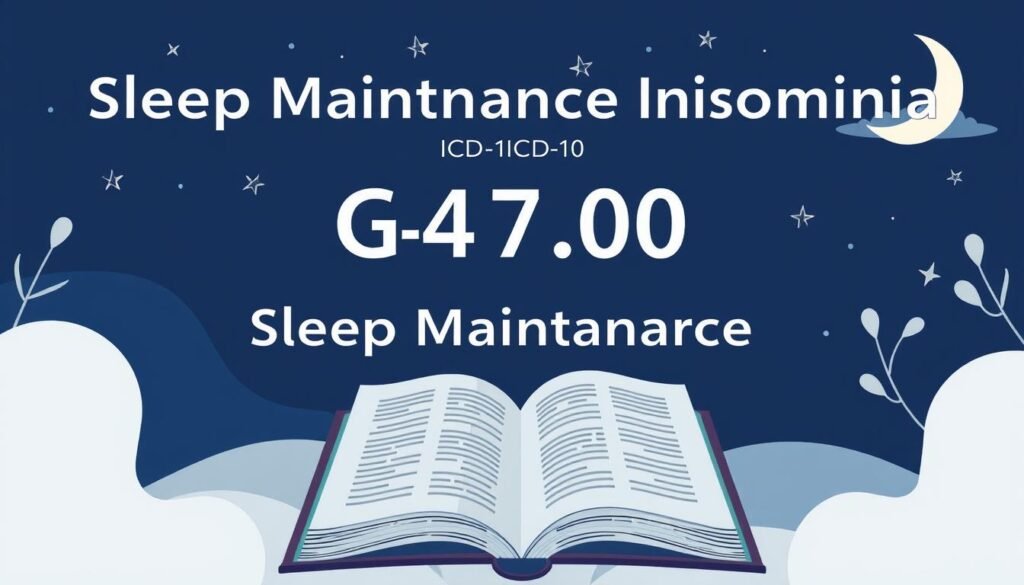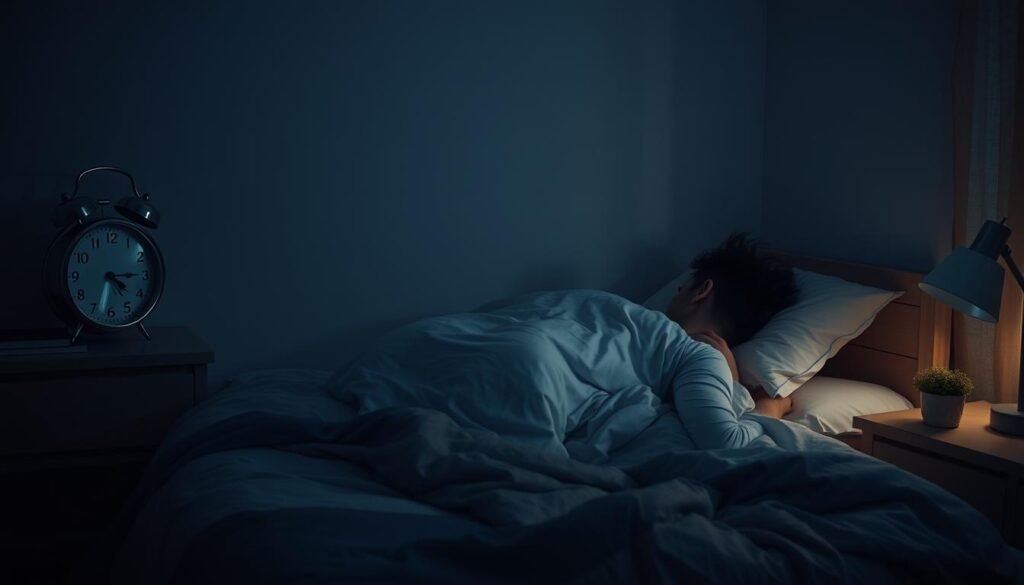Did you know about 30% of adults in the US have trouble staying asleep? They wake up often during the night. The condition is called sleep maintenance insomnia. It’s where folks find it hard to stay asleep. Codes like G47.00 and F51.01 from the ICD-10 help us understand this problem better. This guide talks about the symptoms, causes, and why correct coding is important. It’s useful for both healthcare providers and patients. Knowing what disrupts sleep can help us find ways to sleep better and improve our health.
Key Takeaways
- Approximately 30% of American adults face nighttime wakefulness.
- The ICD-10-CM code G47.00 is effective starting October 1, 2024.
- Accurate coding is crucial for effective management of insomnia disorders.
- Sleep maintenance insomnia can significantly impact overall health.
- New codes have emerged to better define and classify insomnia types.
Understanding Sleep Maintenance Insomnia
Sleep maintenance insomnia is a big issue for many people. It affects their well-being deeply. It comes with many signs and can have different causes. Knowing what this condition is about is key to dealing with it well.
Definition and Symptoms
Sleep maintenance insomnia means having trouble staying asleep all night. This leads to many insomnia symptoms, such as:
- Struggling to fall asleep again after waking up
- Waking up too early and not being able to sleep again
- Feeling tired or fatigued when you wake up
- Being awake a lot during the night
These symptoms show how tricky it can be to figure out insomnia. It’s crucial to properly check everything to find the right treatment.
Common Causes of Sleep Maintenance Insomnia
Many things can lead to sleep maintenance insomnia. Knowing the causes of insomnia helps in tackling the real problem. Some usual causes are:
- Stress and worry
- Health issues like chronic pain or problems with breathing
- Medicines that disrupt how you sleep
- Things in your environment like noise or too much light
To diagnose insomnia, doctors look at these factors and the patient’s health history. Finding out the cause is crucial for better treatment results.
https://www.youtube.com/watch?v=r40g_9dw46o
| Symptom | Description |
|---|---|
| Difficulty Falling Asleep | Having a hard time starting to sleep, often taking more than 30 minutes. |
| Frequent Night Awakenings | Waking up many times during the night. |
| Early Morning Awakening | Waking up much earlier than you want to. |
| Unrefreshing Sleep | Feeling tired even though you spent enough time in bed. |
ICD-10 Overview for Insomnia
ICD-10 stands for the International Classification of Diseases, 10th Revision. It’s a global standard for classifying health issues. It includes various conditions like insomnia in its coding system. This helps doctors and health workers communicate clearly about patient care.
What is ICD-10?
The World Health Organization developed ICD-10. It contains codes for many health disorders. For example, G47.00 is for general insomnia. F51.0 is for insomnia not caused by substances or other health issues. Starting October 1, 2024, there will be a new code, F51.02, for Adjustment Insomnia. This shows that understanding of insomnia is growing.
Importance of Accurate Coding in Sleep Disorders
Correct coding is key to treating sleep disorders well. It helps doctors identify and treat conditions based on thorough checks. The F51.02 code, for instance, helps account for mental health in insomnia cases. About 75 percent of adults in the U.S. have sleep disorder symptoms. So, right coding is essential. It makes sure treatments match diagnoses. It also eases the process for insurance claims and improves care.
| ICD-10 Code | Description | Effective Date |
|---|---|---|
| F51.02 | Adjustment Insomnia | October 1, 2024 |
| F51.0 | Insomnia not due to a substance or known physiological condition | In use since 2016 |
| G47.00 | Insomnia, unspecified | In use since 2016 |
| F51.09 | Other insomnia not due to a substance or known physiological condition | October 1, 2024 |
Sleep Maintenance Insomnia ICD 10: Diagnosis Guide
Proper coding in healthcare impacts patient care greatly, especially in managing insomnia. It ensures that healthcare providers can document conditions well. This helps patients get the right treatment. The code ICD-10 G47.00 is key for healthcare coding. It identifies “Insomnia, unspecified,” which is important for classifying insomnia. This aids in smooth billing and documenting.
ICD-10 Code G47.00 Explained
The ICD-10 G47.00 code is for patients with insomnia that doesn’t fit specific categories. This broad category helps when the cause of sleep problems isn’t clear. Using this code makes tracking insomnia stats easier. It also connects symptoms to possible treatments.
ICD-10 Guidelines for Insomnia Diagnosis
For diagnosing insomnia, it’s key to follow insomnia diagnosis guidelines. Healthcare workers should do a detailed assessment. This includes:
- Getting a full medical history.
- Checking for health issues with physical exams.
- Maybe suggesting sleep studies to watch sleep patterns and find disorders.
These steps ensure accurate insomnia categorization under the right ICD codes. Using ICD-10 G47.00 and other codes helps healthcare workers. They can offer better treatment tailored to each patient.

Diagnostic Criteria for Sleep Maintenance Insomnia
Knowing how to diagnose sleep maintenance insomnia is key to treating it well. Doctors must figure out what causes someone’s sleep problems. Then, they can find the best ways to help.
Clinical Evaluation and Patient History
When doctors look into sleep maintenance insomnia, they start with the patient’s history. They check how sleep is disturbed and look at the person’s health. The insomnia diagnosis criteria in the DSM-5 talk about being unhappy with sleep quality or amount. People may have trouble falling asleep, staying asleep, or wake up too early and can’t sleep again.
These sleep problems need to happen at least three nights a week for over three months. They must also make daily life harder or more stressful. Insomnia can be short-term, ongoing, or come and go. This helps doctors pick the best treatment.
Role of Sleep Studies and Diagnostic Tests
Sleep studies are very important for diagnosing sleep maintenance insomnia. Polysomnography and other insomnia tests look at how you sleep. They check if there are other reasons for insomnia. These sleep studies also look for other medical or mental issues that could affect treatment.
Doctors use patient history and sleep studies to make a good treatment plan. They make sure insomnia isn’t caused by other sleep or mental health conditions. For more on insomnia, ICD-10 codes have lots of information on diagnosing and treating it.

Potential Medications That Cause Insomnia
It’s key to know how some meds can make it hard to sleep. Some drugs, especially those for various health issues, might make insomnia worse. Knowing which medications do this can help people choose their treatment wisely.
Common Prescription Drugs Leading to Sleep Issues
Some prescription drugs worsen sleep problems. Drugs like antidepressants, corticosteroids, and stimulants are known to affect sleep quality. Here’s a list of medication types that could cause insomnia:
- Antidepressants
- Corticosteroids
- Stimulants for Attention Deficit Hyperactivity Disorder (ADHD)
- Beta-blockers
- Some antihypertensives
Talking to a healthcare expert can shed light on these meds that cause insomnia. They can help decide if changing meds is needed.
Over-the-Counter Remedies and Their Effects
OTC sleep aids seem like an easy fix for sleep trouble. But, these OTC sleep aids might not work for everyone. They can also cause dependency or unwanted effects. Ingredients like diphenhydramine or doxylamine can make you feel tired the next day, making it harder to sleep well. It’s wise to consider both the good and bad of these OTC options.
To learn more about insomnia and how to manage it, check out these tips for better sleep. It’s important to think about the pros and cons of any sleep aid, whether it’s prescribed or over-the-counter. Always put your health first.

| Medication Type | Common Examples | Potential Insomnia Effects |
|---|---|---|
| Antidepressants | Fluoxetine, Sertraline | May disrupt sleep patterns |
| Corticosteroids | Prednisone, Hydrocortisone | Can cause insomnia or disrupted sleep |
| Stimulants | Adderall, Methylphenidate | Increased alertness at night |
| OTC Sleep Aids | Diphenhydramine, Doxylamine | May lead to next-day drowsiness |
Treatment Options for Sleep Maintenance Insomnia
Managing sleep maintenance insomnia requires different strategies. Adjusting lifestyles, using special sleeping techniques, and taking medications are key. Together, they help improve sleep quality. It’s important to customize these methods to meet personal needs.
Lifestyle Changes and Behavioral Therapy
Lifestyle changes can greatly improve sleep. Setting a regular sleep routine and making your bedroom sleep-friendly are crucial. Practices like deep breathing or meditation can lower stress.
Cognitive Behavioral Therapy for Insomnia (CBT-I) is effective for long-term insomnia. It lasts six to eight weeks. The therapy addresses negative thoughts and actions affecting sleep. It gives people techniques to solve their sleep problems.
Medications to Manage Insomnia
Sometimes, medications are needed for insomnia. They tackle sleep issues directly. Non-benzodiazepine sedatives are options that aid in falling asleep quickly. They don’t carry the risks of traditional sleeping pills.
But, considering medicines requires careful thought about side effects and drug interactions. Medicines should be part of a bigger plan. This includes making lifestyle changes and undergoing therapy. A comprehensive plan leads to lasting sleep quality improvements.
| Treatment Type | Description | Duration/Effectiveness |
|---|---|---|
| Lifestyle Changes | Consistent sleep schedule, reducing caffeine, creating a sleep-friendly environment | Ongoing; results may vary |
| Behavioral Therapy | Cognitive Behavioral Therapy for Insomnia (CBT-I) | 6-8 weeks; effective for many individuals |
| Medications | Non-benzodiazepine sedatives aimed at sleep onset | Varies; typically used short-term |
Side Effects of Treatments and Medications
Sleep medications can help with insomnia but have risks. It’s important patients know about the side effects medications may bring. This includes dependency, not functioning well during the day, and other health issues. It’s key to understand the sleep medication risks to make good choices.
Understanding the Risks of Sleep Medications
Insomnia medications can work but also have big side effects. Patients often feel groggy or cloudy in the morning, hurting productivity. Using them long-term can lead to dependency, making it hard to sleep without the drug.
Doctors stress the importance of talking about the risks and benefits. Knowing about side effects medications helps people make smarter choices.
Alternative Remedies and Their Side Effects
Herbal supplements like melatonin are seen as safer. But, they can still cause problems like upset stomach and headaches. Some people may even have allergic reactions.
Talking to a healthcare professional before trying these remedies is wise. They can check for bad mixes with other medicines or health issues. Staying informed about alternative insomnia treatments helps in weighing options.
| Type of Treatment | Common Side Effects |
|---|---|
| Prescription Sleep Medications | Dependency, grogginess, impaired memory |
| Over-the-Counter Sleep Aids | Dizziness, drowsiness, nausea |
| Herbal Supplements | Digestive issues, headaches, allergic reactions |
Impact of Other Conditions on Sleep Maintenance Insomnia
Understanding sleep maintenance insomnia involves looking at how mental and physical health interact. Many people suffer mental health insomnia because of psychological conditions. These disorders, such as anxiety and depression, can disrupt sleep. This lack of sleep can then worsen the mental health problems, starting a vicious cycle known as insomnia comorbidity.
Effects of Mental Health Disorders
Anxiety and depression affect sleep the most. They make it tough for someone to fall and stay asleep, leading to poor sleep. Being stressed and overthinking at night makes this even worse. It’s key to focus on both mental health and sleep quality together.
Studying behavior patterns helps understand and find treatments. Treatments like Cognitive Behavioral Therapy for Insomnia (CBT-I) could be very helpful. Studies looking into this have shown positive outcomes.
Influence of Physical Health Issues
Physical health and sleep are closely linked. Issues like chronic pain or breathing problems mess with sleep cycles. Studies say almost 75% of people with chronic insomnia also have physical health issues that affect their sleep. Knowing how these health problems cause sleep issues is a step toward better treatments.
It’s key to handle physical health problems along with sleep issues. Doing this can improve overall health.
| Condition | Impact on Sleep | Treatment Recommendations |
|---|---|---|
| Anxiety Disorders | Difficulty maintaining sleep; frequent awakenings | CBT-I; relaxation techniques |
| Depression | Insomnia or hypersomnia; disrupted sleep patterns | Medication management; therapy |
| Chronic Pain | Inability to find a comfortable sleeping position | Pain management strategies; physical therapy |
| Respiratory Conditions | Frequent awakenings due to breathing difficulties | Medical treatment; improved sleep hygiene |
Creating an environment that supports mental and physical health can help. This approach stops the insomnia comorbidity cycle. It helps people get better sleep.
Conclusion
Sleep maintenance insomnia greatly affects many people’s lives. The sleep maintenance insomnia overview shows common symptoms. These include trouble sleeping, waking up often, and feeling tired during the day. Knowing these signs and the ICD-10 code G47.00 for insomnia is key. This knowledge helps doctors diagnose and treat this sleep issue correctly. Healthcare providers, especially those using Tebra’s EHR+ system, are important in making insomnia treatments better.
Raising awareness about insomnia is vital. It helps people understand that they can get help and proper care. Doctors should also look for other issues like anxiety or mood disorders that can happen with insomnia. This makes treatment plans more effective. Doctors need to evaluate patients carefully and keep accurate records. This ensures patients get the best care and insurance coverage.
Understanding sleep maintenance insomnia’s challenges helps improve patient care. Diagnosis and treatment knowledge are crucial. Better management and more awareness can lessen the impact of this widespread problem. This can lead to improved health and well-being for those struggling with insomnia.